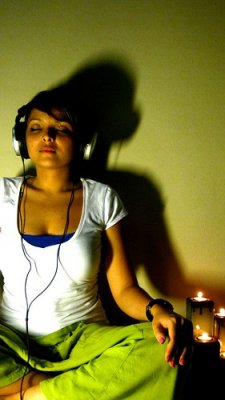“I am Bored” – What Boredom Can Hide and How to Get Excited Again

photo by: Houcine Ncib
by Andrea M. Darcy
Has your life changed lately? Moved to the countryside, just graduated, working less or not at all, and finding yourself feeling… blah? Find yourself constantly thinking, “I am bored”?
What is boredom?
The way one person feels when saying “I’m bored” might be entirely different from what another person feels when they say the same thing.
Psychology itself has not nailed down an exact definition. But a 2012 survey of prior boredom research has led to the current concept that the two main ingredients of boredom are 1) something unpleasant and 2) something ‘low-arousal’, meaning we don’t feel stimulated or interested by it.
The good and bad of dealing with boredom
If “I’m bored” always translates into a day spent bingeing on snacks, social media, and Netflix? Not so great. BUT there are ways to make boredom a win instead.
1. Turn boredom into a trigger for creativity.
The first impulse many of us have when bored is to seek distraction through the creativity of others. We binge on films or books. But we are missing an opportunity to embrace our own ideas.
Psychologist Sandi Mann feels boredom can give our minds necessary space to daydream and create.
She led a study at the University of Central Lancashire and found that when asked come up with as many uses for plastic cups as possible? It was a group that had first experienced the boredom of copying out numbers from a phone book that then came up with the best answers. Boredom created the fertile ground for great creativity.
2. Allow yourself to be nostalgic.
Find yourself going through old photos and pining for a life you once had before everything felt endlessly boring? It’s actually not a bad tactic.
Researchers at the University of Limerick led by Wijnand Van Tilburg and Eric Igou found a positive link exists between nostalgia and boredom. When we are bored we think of the past, and that nostalgia then has us longing for meaning. This longing in turn pushes us to take actions to find meaning, to counteract the boredom.
3. Do something for someone else.
One of the things van Tilburg and Igou found was that when people were driven by nostalgia to seek meaning, they then showed a tendency towards caring acts, such as blood donation, to replace their feelings of emptiness. So now might be the time to shop for a bedridden neighbour, or volunteer for a mental health helpline.
3. Get some “God”.
The same researchers then did another study that looked at whether already having a sense of meaning and purpose would make us less likely to experience boredom in the first place. They found that religious people “reported higher perceived meaning in life, which was associated with a reduced tendency to feel bored.”
Of course you don’t have to join a religion to feel a sense of meaning! You can explore your own ideas of spirituality and life purpose. Need help with this? Both existential therapy and transpersonal therapy focus on helping you find your unique sense of purpose.
5. Try mindfulness.
Sometimes we say we are bored when really we are uncomfortable. Not filling our time with ‘busy tasks’ means all our unprocessed experiences can start niggling to the surface, in a mess of emotions and strange thoughts.
It can help to see boredom as an opportunity and turn to the tool of mindfulness. Instead of reaching for the nearest distraction, sit quietly, breathe, and simply observe, without judgement, the thoughts and feelings that come up. What are they trying to tell you? What might you need to face and heal?
[Read our free “Guide to Mindfulness” if you need clear instructions.]
Why do I get bored so easily?
Being bored more easily that others can be a personality trait, a way of being we are born prone to.
But it can sometimes be a sign of mental health issues. The obvious one is attention deficit hyperactivity disorder (ADHD). And there is also a strong link with depression.
Boredom and depression
Boredom and depression can seem similar. Both feel unpleasant, and like we are ‘flatlining’.
Boredom leaves us feeling trapped or annoyed, but we don’t feel that we can’t do the task, or that there will be no escape from the situation. We are left annoyed with the world.

By: Sean MacEntee
Depression, on the other hand, is internal looking. We feel not good enough, worthless, or even like we don’t deserve to exist. And depression involves a feeling of hopelessness.
Feelings of boredom can, however, be a sign of depression if they come alongside feelings of hopelessness and cycles of negative, ‘doom and gloom’ thinking.
So if you are saying, “I am bored because of this lockdown”, but then feel better imaging all you will do when it ends? It’s just boredom.
If you are thinking, “I am bored with this lockdown and the world will never be the same and what’s the point?” You might have depression.
Boredom and poor parenting
Again, always feeling “I’m bored” can again also be your brain’s way of avoiding facing and processing difficult emotions.
But where are those uncomfortable thoughts and emotions from? They can be a product of difficult childhoods, or even unresolved childhood trauma.
Part of your difficult childhood might have involved undue punishment for small things, or only being given love if you were ‘good’. The ‘Boredom Lab’, an incentive committed to understanding boredom at York University, explains that:
“Individuals who are very sensitive to reward or punishment are more likely to experience boredom. High punishment sensitivity people often withdraw from activities because they find the environment threatening. In contrast, high reward sensitivity people need more and more exciting activities to fulfil their need for pleasure, and thus find many environments under-stimulating.”
Can boredom be a sign I need therapy?
- Does your ‘boredom’ sees you engaging in behaviours like alcohol abuse, bingeing on porn, or overeating?
- Or does it come along with very dark thoughts? Do you start to wonder if life is worth living?
- Do your feelings of boredom tend to come not when there is nothing to do, but when you are in the middle of doing something important? And do you then act impulsively?
The above describes addiction, depression, and adult ADHD. If any of it sounds like you, it’s a great idea to seek some professional support.
Ready to face what’s beneath your feelings of boredom? Our top London-based therapists are now available by video conferencing. Or find affordable online therapy on our booking platform.
 Andrea M. Darcy is a mental health and wellbeing expert and mentor, with training in person-centred counselling and coaching. She has ADHD and a high IQ, so had tried all these tools for boredom herself!. Find her on Instagram @am_darcy
Andrea M. Darcy is a mental health and wellbeing expert and mentor, with training in person-centred counselling and coaching. She has ADHD and a high IQ, so had tried all these tools for boredom herself!. Find her on Instagram @am_darcy





